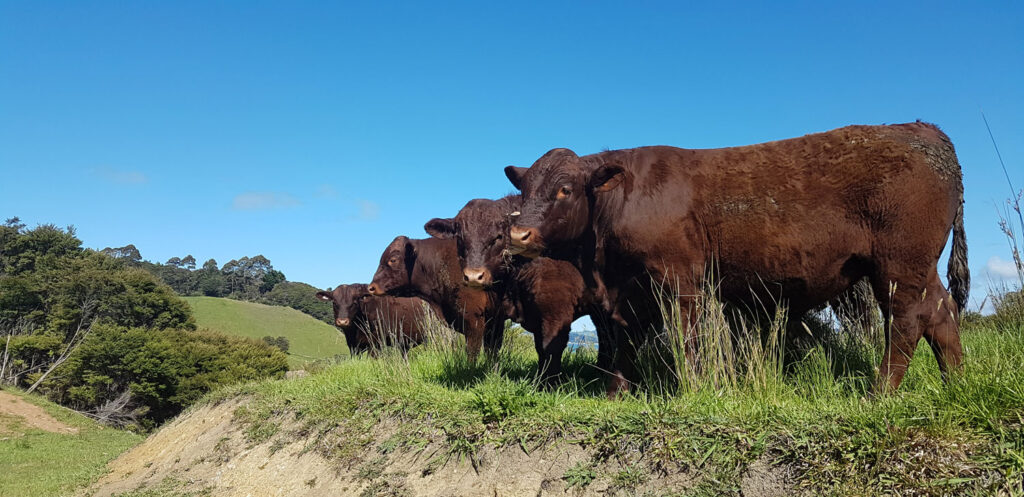Learn more about the general advantages of Red Devons, with evidence of how they are advantaged over other breeds and how those genetics were developed and nurtured.
Here we discuss why Red Devons suit a Beef Breeder
- High quality meat
- Consistent, high Weight Gain and rapid maturity
- Advantageous carcass ratios
- Robust foraging
- General hardiness
Which is achieved with greater ease through
- Agreeable temperament
- High fertility
- Calving ease
- Strong Mothering and Milking Ability
- Longevity
- Resilience across extreme weather and environmental ranges
- Genetic Integrity
Red Devon beef is well recognised and of the finest eating quality, with whiteness of fat and good marbling which enhances the taste. This is “gourmet beef”. Their temperament has a favourable effect on the ph of the animal at slaughter. Docility and intelligence, as well as muscling ability were basic requirements when they were used as draft animals.
Red Devons are an early maturing breed. Bull calves average 1.2 kilograms per day from birth to weaning and heifers 1 kilogram. They combine rapid weight gain as well as adequate muscle and carcass characteristics, with the ability to fatten at an early age and will normally yield upwards of 60%.
In today’s economic climate with increasing farm running costs, increased cost of feed, and changing weather pattens worldwide, operating a more efficient unit is paramount. Red Devon cattle have always been regarded as one of the most efficient breeds available and this has been proved by numerous cattle trials throughout the world, some dating back hundreds of years.
By maintaining feed quality on steep country, they play a major role in profitability on these farms. Their low maintenance requirements make them easy cattle to over-winter, with minimal supplementary feed required. Because of their nature and medium size, pugging of the pasture is kept to a minimum during winter months.
Cows are quite capable of producing and rearing ten or more calves in a lifetime. A good bull will service 65-70 cows in a season and look like he never went out. Because of the constitution and the longevity of the breed, bulls have been known to be still working at the age of fourteen.
With global consumers increasingly demanding to know the provenance of their food, grass-fed beef is undergoing a renaissance, and the Red Devon is very quickly becoming more recognised as a breed of the future. Nowhere is this more so than in America at present, with herds the width and breadth of the country infused with New Zealand Red Devon grass-fed genetics.
Red Devons are also well-suited to organic farming properties. In the U.K., they are recognised as “the ideal conservation grazer”, because of their gentle browsing nature.
To purchase breeding stock, check our sales listings or contact a breeder on our breeders page.

